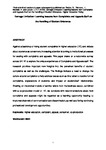Damage Limitation: Learning Lessons from Complaints and Appeals Staff on the Handling of Student Grievance
| dc.contributor.author | Gedye, Sharon | |
| dc.contributor.author | Dismore, Harriet | |
| dc.contributor.author | Muneer, R | |
| dc.contributor.author | Cotton, Debby | |
| dc.date.accessioned | 2019-06-19T08:00:11Z | |
| dc.date.available | 2019-06-19T08:00:11Z | |
| dc.date.issued | 2019-06-03 | |
| dc.identifier.issn | 0952-8733 | |
| dc.identifier.issn | 1740-3863 | |
| dc.identifier.uri | http://hdl.handle.net/10026.1/14330 | |
| dc.description.abstract |
Against a backdrop of rising student complaints in higher education (HE) and debate about students as consumers, increasing attention is turning to institutional processes for dealing with complaints and appeals. This paper draws on a nationwide survey across UK HE to explore the unique experiences of Complaints and Appeals staff. The research provides important new insights into the perceived benefits of student complaints as well as the challenges. The findings indicate a need to change the culture around complaints to help address issues such as time taken to resolve formal complaints, expectations of students and impact on student/staff relationships. Drawing on theoretical models of service failure from the business sector, combined with a co-production model of HE, we conclude with recommendations about how complaints and appeals might be regarded as a learning opportunity leading to improved channels of communication and dissemination, as well as offering continuing professional development opportunities. | |
| dc.format.extent | 520-539 | |
| dc.language | en | |
| dc.language.iso | en | |
| dc.publisher | Springer Science and Business Media LLC | |
| dc.subject | higher education | |
| dc.subject | complaint | |
| dc.subject | appeal | |
| dc.subject | consumer | |
| dc.subject | co-production | |
| dc.title | Damage Limitation: Learning Lessons from Complaints and Appeals Staff on the Handling of Student Grievance | |
| dc.type | journal-article | |
| dc.type | Journal Article | |
| plymouth.author-url | https://www.webofscience.com/api/gateway?GWVersion=2&SrcApp=PARTNER_APP&SrcAuth=LinksAMR&KeyUT=WOS:000651818200010&DestLinkType=FullRecord&DestApp=ALL_WOS&UsrCustomerID=11bb513d99f797142bcfeffcc58ea008 | |
| plymouth.issue | 2 | |
| plymouth.volume | 34 | |
| plymouth.publication-status | Published | |
| plymouth.journal | Higher Education Policy | |
| dc.identifier.doi | 10.1057/s41307-019-00150-4 | |
| plymouth.organisational-group | /Plymouth | |
| plymouth.organisational-group | /Plymouth/Faculty of Arts, Humanities and Business | |
| plymouth.organisational-group | /Plymouth/Faculty of Arts, Humanities and Business/Plymouth Institute of Education | |
| plymouth.organisational-group | /Plymouth/Faculty of Health | |
| plymouth.organisational-group | /Plymouth/REF 2021 Researchers by UoA | |
| plymouth.organisational-group | /Plymouth/REF 2021 Researchers by UoA/UoA23 Education | |
| plymouth.organisational-group | /Plymouth/Users by role | |
| plymouth.organisational-group | /Plymouth/Users by role/Academics | |
| dcterms.dateAccepted | 2019-05-21 | |
| dc.rights.embargodate | 2020-6-2 | |
| dc.identifier.eissn | 1740-3863 | |
| dc.rights.embargoperiod | Not known | |
| rioxxterms.versionofrecord | 10.1057/s41307-019-00150-4 | |
| rioxxterms.licenseref.uri | http://www.rioxx.net/licenses/all-rights-reserved | |
| rioxxterms.licenseref.startdate | 2019-06-03 | |
| rioxxterms.type | Journal Article/Review |


